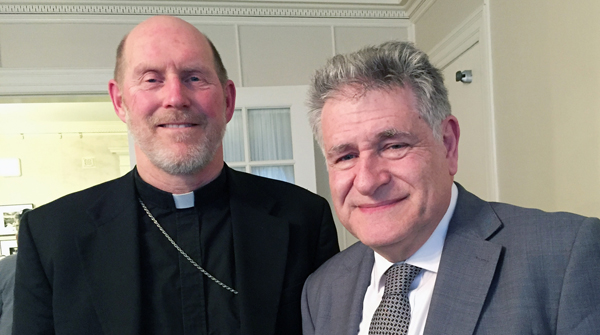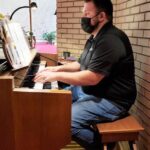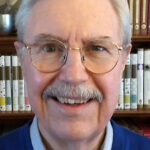
Bishop Thomas Zinkula and Rabbi Abraham Skorka are pictured in Grinnell on April 16. Rabbi Skorka spoke about his friendship with Pope Francis.
Friendship embraces interfaith dialogue
By Barb Arland-Fye
The Catholic Messenger
GRINNELL — The day before his papal inauguration, Pope Francis telephoned his friend Rabbi Abraham Skorka and asked him to send an email address so the two could stay in touch. Rabbi Skorka recounted the phone call over dinner with Bishop Thomas Zinkula and other guests at the Grinnell House on April 16. “He is faithful to his friends,” the rabbi said of the pope.
After dinner, Rabbi Skorka gave a talk on their long friendship, which blossomed through their deep and shared interest in interfaith dialogue that began in the 1990s in Buenos Aires, Argentina. Grinnell College’s Rosenfield Program hosted the rabbi’s talk at St. Mary Catholic Church in Grinnell.
Rosenfield Program Director Barbara Trish, a professor of political science at Grinnell College, said she invited Rabbi Skorka to speak at the encouragement of Professor Emeritus Harold Kasimow. He and the rabbi share a connection to a prominent voice in Judaism, the late Rabbi Abraham Joshua Heschel. Kasimow studied under Heschel, who also taught Rabbi Skorka’s mentor, Rabbi Marshall T. Meyer.
Rabbi Skorka currently serves as a professor at St. Joseph University in Philadelphia where he works closely with directors of the university’s Institute for Jewish-Catholic Relations. Kasimow thought the rabbi’s assignment in the U.S. offered a great window of opportunity for Grinnell College. The two, who had never met in person, greeted each other warmly before dinner at the Grinnell House.
“Rosenfield’s mission areas are public affairs, international relations and human rights. Religion and politics certainly is on the front burner of politics in the U.S., and the notion of interreligious dialogue and activity is a theme that deserves more attention,” Professor Trish said. “The dialogue between the rabbi and pope certainly aspires to a vision that will address problems confronting nations across the globe — and will work toward international peace. And regarding human rights, at a very basic level, the rabbi is talking about religious rights and freedoms —not just of Jews, but of all faiths.”
Rabbi Skorka’s interest in interfaith dialogue has its roots in his childhood in Buenos Aires when he learned about the Shoah, the mass murder of European Jews by the Nazis during World War II. “The image of my father trying to understand the incomprehensible haunted me throughout my life,” the rabbi said. He learned that “violence is not the ultimate solution to conflict” and that the prevention of violence can only occur with conversion of heart. Conversion begins with dialogue.
During rabbinical studies, Rabbi Skorka was exposed to the writings of Jewish philosopher Martin Buber through whom “I discovered and learned the power and deep meaning of the concept of dialogue,” he said. His introduction to the writings of Rabbi Heschel inspired an interest in interfaith dialogue.”
Jews and Christians didn’t engage in dialogue for many years because of a deeply imbedded anti-Semitism resulting from Christians over the centuries portraying Jews as tools of the devil who killed the Son of God, Rabbi Skorka said. Jews were an accused people, which set the stage for Nazism.
Efforts at dialogue began in the 1950s. The Second Vatican Council moved interfaith dialogue forward, most notably with publication of “Nostra Aetate,” the “Declaration on the Relation of the Church to Non-Christian Religions” in 1965. One passage reads: “Since Christians and Jews have such a common spiritual heritage, this sacred council wishes to encourage and further mutual understanding and appreciation. This can be achieved through friendly discussions (Chapter 4).”
Rabbi Skorka said Pope Francis has made the greatest strides in interfaith dialogue. They co-authored a book of their interreligious conversations titled “On Heaven and Earth,” published in 2010 when Pope Francis was Cardinal Jorge Mario Bergoglio. Topics included God, fundamentalism, atheism, abortion, homosexuality, euthanasia, capitalism and globalism. The book was a New York Times Bestseller. They also recorded more than 30 television programs on dialogue.
Pope Francis has included Rabbi Skorka in significant interfaith and interreligious events, including the planting of an olive tree in the Vatican Gardens in 2014. During that historic event, Pope Francis welcomed Israeli President Shimon Peres and Palestinian President Mahmoud Abbas to come together to pray for peace.
Earlier this year, Pope Francis signed a Catholic-Muslim declaration with Sheik Ahmad el-Tayeb, the grand imam of Al-Azhar, in a ceremony in the United Arab Emirates. The declaration will not suddenly bring about world peace, Rabbi Skorka said, but it will serve as a guide for the way ahead.
Father Ross Epping, pastor of St. Mary Parish in Grinnell, was inspired by Rabbi Skorka’s talk. “Blessed friendships are a dime a dozen these days, especially in a world that pits us against one another at every twist and turn of life. It was refreshing, and invigorating, to witness the friendship spoken about by Rabbi Skorka,” the priest said.
“Rabbi Skorka’s talk surpassed the parameters of that friendship, though. It was not simply about an unlikely friendship; it was about the immeasurable importance of digging deep, person-to-person, on an individual level, to bring about understanding, love and appreciation of our differences. Kinship, love, communion — these aspects of life that we so easily forget in the digital age of individualism are precisely what the work of ecumenical dialogue is all about. This was showcased so well in the rabbi’s presentation. And my ongoing hope is that it will continue to stand as a challenge to us who were there to hear it.”
Bishop Zinkula said he enjoyed meeting Rabbi Skorka and conversing with him at dinner prior to his talk. “He has an engaging personality and an interesting story to tell, which includes his longstanding friendship with Pope Francis. I was especially drawn to what he had to say at dinner and during his talk about Rabbi Heschel. I have read many of his books and greatly admire him.”
“Rabbi’s Skorka’s message that it is the responsibility of individuals to work to improve themselves really resonated with me as a teacher,” Professor Trish said. “Similarly, the rabbi commented in conversation over the course of the day that Pope Francis’ decision to open the Vatican archives is in the interest of learning from history, again a great message for an academic institution.”











